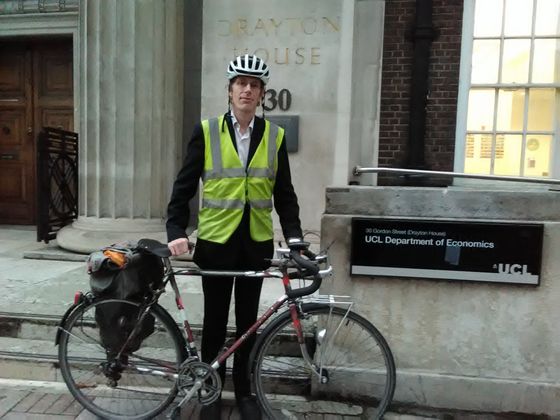Why Underfunding Education & Scientific Research is a False Economy.
In 2016 & 2018, I cycled from London to to Copenhagen to protest against cuts in funding to education & research.
Why Government Funding for Scientific Research & Education is Important
Parents are being "Charged" for their Children's State Education.
British state schools ask parents to each contribute hundreds of pounds per year to school funds: schools are effectively charging for “free” education. When I was at school, in the 1980s, my parents were only asked to contribute £1 per year!
25% of secondary school students receive private tuition; in other words, parents are paying to bring their children’s education up to acceptable standards! This will also increase exclusivity and reduce social mobility.
In the short term, we may cut taxes by cutting education funding but parents are being taxed through the back door if we expect them to contribute to school funds and pay for additional tuition. Besides, not all parents can afford to pay! We will all pay higher taxes, in the long run, if industries suffer because people are not properly educated in science, technology, engineering and maths (STEM subjects)!
Research that Would Never have Attracted Industrial Funding.
- Sir Isaac Newton's mechanics' research that gave us the laws of motion that put us on the moon.
- Alessandro Volta's battery.
- The work of Michael Faraday & Hans Christian Oersted on the link between electricity and magnetism; mains electricity and many electrical appliances depend on this.
- Pioneering x-ray crystallography by Von Laue and the Braggs is now used to find the structure of matter, including viruses like Covid-19; this helps us develop drugs and vaccines to defeat the diseases.
What if we Rely on Industry to Fund Research?
A growing problem is antibiotic resistance. Unfortunately, there is little profit in developing new ones; hence governments must fund such research, if we are to avoid the "antibiotic apocalypse". Drug companies are willing to develop drugs to treat chronic conditions because such medicines are taken for long periods, unlike antibiotics.
Without government funding, will never go to Mars, or other planets. Sooner or later, earth will suffer a catastrophe, like the one that wiped out the dinosaurs, and, if we want the human race to continue, we need to establish colonies on other worlds! Also, as we deplete resources on earth, we will need to get them from elsewhere.
There may be microbial life in the Martian soil (and that of other worlds) and, if this is so, some may have evolved to produce antibiotics to kill other species that would compete with them for resources - as has happened here on Earth! Hence Mars (and other worlds) could be a rich source of new classes of antibiotics!
If the panspermia theory (that life was seeded from space) is true, Martian microbes are likely to be similar the Earthly ones and hence Martian antibiotics may be effective against Earthly pathogens! According to the widely held pseudo-panspermia theory, the building blocks of life came from space; if this is true, Martian microbes may be similar to Earthly ones and hence we may still be able to use the Martian antibiotics!
Life on alien worlds may have evolved to produce broad spectrum antivirals, that we could use.
What can we do?
Apart from the obvious (eg writing to politicians) we can get the public more interested in science. If more people care about science, governments will be more willing to fund it.
Universities and researchers (including PhD students) could issue press releases to local and national media about their work. Organizations that hold public, scientific, events could also issue press releases. The media would be especially interested in work that is relevant to science fiction or everyday life.
Another way to publicise events is to produce flyers and ask libraries to exhibit them.
I spent nearly twenty years writing press releases, and producing flyers, about public events organised by my local branch of the Institute of Physics (who do not endorse this website).
My Youtube videos
Galileo's work, including his work on pendulums (which gave us accurate clocks), would never have attracted funding from industry. The science of metrology would not have got corporate funding. Metrology gives us accurate and consistent units of measurement. The first two videos are about metrology. The first and third feature pendulums. Below are the titles and links to them.
How the British Invented the Metric System.
https://www.youtube.com/watch?v=qL6eegyn3J8
How Metric Beats Imperial
https://www.youtube.com/watch?v=10FZR3BpGws
Accurately Measuring Gravity with Yoyos - not Quite as Seen on "Doctor Who"
https://www.youtube.com/watch?v=Ar2y9SAoq5s&t

